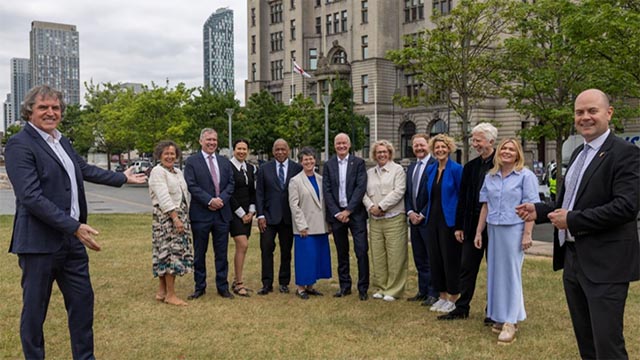Suave, well-travelled and with an elegant turn of phrase, Savills’ Jeremy Helsby usually yields to no man on these qualities. But it was Xu Weiping who stole the show at the two firms’ signing ceremony this week.
Wearing a fabulous shirt with an ornate golden pattern – Xu, that is, not Helsby – the chairman of Beijing-based developer ABP held court. Talking through a translator, he said he had lost his speech, but would speak “from the bottom of my heart”. In the UK and China, he talked of a couple “deeply in love”.
“Savills and ABP are falling in love,” said the translator, “as well as Mr Xu and Mr Jeremy.”
At that point Xu seemed to look for a wedding ring to officially commemorate the union. A signed contract that will see Savills promote ABP’s business projects worldwide – with remuneration through a combination of consultancy and agency fees – will do nicely, Helsby might have thought.
The agreement is symbolic on so many fronts. When he talked of marriage, Xu used a light touch to make a serious point: the fact that Cameron, Boris, Osborne and others are shuttling between London and Beijing with such frequency highlights how important this courtship is to the UK’s future prosperity.
For Savills, a firm that has been so active in Asia for so long, it is vital that that hard work pays dividends, particularly given the cooling in the Hong Kong residential market that has served them so well in the past.
But perhaps most symbolic of all is the size of the Royal Albert Dock project that ABP has made its first international foray. Its ambition to create a third business district in London that will be a home from home for Asian businesses abroad is a huge deal for this country: with 3.5m sq ft of commercial space and a potential £6bn value to the London economy, it is hard to think of another project that has as much potential to reshape the capital.
But consider this: ABP is currently working on three major projects in China. And the smallest, in Beijing, is three or four times the size of the Royal Albert Dock scheme.
That, in a nutshell, is the UK’s challenge in the decades ahead. It is vital that London is seen as a global business centre, and at very least as the gateway to Europe. Staying relevant is the starting point. Capitalising on reputation and experience – while celebrating cultural, and even sartorial, differences – is what will ultimately deliver.
¦ A name check to one more contributor to the signing ceremony. Alexandra Gumuchian, currently on the Savills graduate scheme, translated into Mandarin contributions from Helsby and development director David Williams. With a four-month spell in the firm’s Shanghai office already under her belt, Gumuchian is assembling the kind of CV that the property industry will rely upon in the future.
¦ Encouraging news in the latest De Montfort University property lending report: the reduction in outstanding UK commercial real estate debt has started to ease this year as new lending increases. And the increased activity is not just coming from alternative lenders; traditional issuers are more active too. Plenty of people in property say they would be glad to see the back of the banks. The truth is that not only can property not afford to see them flee, the banks themselves can’t afford to withdraw from such an important lending market either.
¦ Congratulations to all the winners of EG Awards on Thursday night. A fabulous time was had by all. There will be no Estates Gazette next week – we are back on 4 January. But we will put together a digital edition celebrating the event, so do keep an eye on your inboxes. In the meantime, pause for breath after a year that ended better than it started, have a great Christmas and a happy New Year.
Damian.Wild@estatesgazette.com











